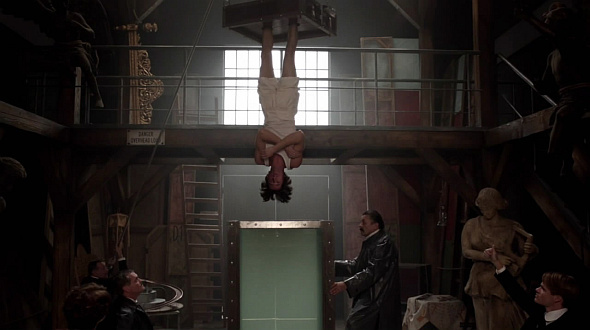Who is He? Houdini, That’s Who

The HISTORY Channel four-hour biopic of the famous magician’s life aired last week on Labor Day, and the question on almost no one’s mind is, how it is?
First please note that I make no claims to familiarity with Houdini’s life, and didn’t go out on the Internet to see if what is presented here is reliable. A certain part of his career lives on in the myth and legend of the man—the Chinese Water Torture Cell, the vanishing elephant, his interest in spiritualism—but whether it’s presented accurately here, I don’t know. I suspect that Houdini’s story has become so glamorized by now that very few sources can accurately describe his life.
With that in mind, the movie jumps back and forth through Houdini’s life, starting with his leap into an icy river. When he becomes trapped beneath the ice, Houdini’s life flashes before his eyes and we jump back to his childhood in Appleton, where he is dedicated to his mother Cecilia. He then hops a train and travels to New York, apprentices as a magician, starts his career, marries Bess, and then it flashes back to an incident during his childhood trip. There are a couple of similar time jumps, such as in part 2 when Houdini is thinking back to when he performed a spiritualism act.
The gist of the movie, as written by Nicholas Meyer (‘The Seven-Percent Solution’, ‘Star Trek 2: The Wrath of Khan’, ‘Time After Time’) based on his father’s book analyzing Houdini’s psyche, is that Houdini had mother issues. And was a glutton for the spotlight. And wanted to escape an ordinary life. And liked to let people gut-punch him. And was kind of a dick.
This is all told through two metaphors, hauled out about every ten minutes on average. The first metaphor is Harry describing every shock in his life as a punch to the gut. Those familiar with Houdini know that he died after being punched in the gut, rupturing his appendix. So there’s a lot of foreshadowing here as every time Harry receives bad news, he visualizes being punched in the gut.
The other metaphor is escape. Harry is always trying to escape an ordinary life, and boredom, and tedium, and maybe even life. This is conveyed through Adrien Brody’s voiceover work, as he goes on about escaping life, and escaping to the world beyond. And speeches mostly to his wife Bess about how he doesn’t want to be stuck washing dishes.
The movie is a series of vignettes about Houdini’s life. Some events get minimum screen time and seem to be there for the Houdini purists, whoever they may be. For instance, we learn very little about Harry’s rivalry with his brother, fellow magician Dash. He just kind of reappears as an adult in the second night. There’s also a brief mention of Houdini’s failed movie career and his interest in airplanes, but they come and go without making much impact.
On the other hand, some scenes drag on interminably. An escape from a cannon in the second part goes on forever and seems to serve no purpose. As does a sequence in part 1 where Harry breaks into the Germany embassy Mission: Impossible style to steal some war plans and is forced to hide in a safe.
I’ve seen some reviewers claim that the movie is filmed in a “modern” manner, but what do they expect? It’s a modern director, filming for a modern audience. Like with ‘Sherlock’, director Uli Edel uses special effect techniques to convey that Harry is superhuman: x-ray views of Harry coughing up a lockpick that he’s swallowed or dislocating his shoulder, internal shots of the safes that he opens.
Since it’s a “modern” movie, people won’t mistake it for earlier Houdini movies. There are several sex scenes, a bit or two of almost-nudity (male and female), and several soap-operaish scenes of Harry and Beth yelling at each other about the problems in their relationship. The point of the sex scenes isn't clear, although perhaps the fact none of them are between Harry and Bess is supposed to be significant. One is interrupted when Harry hears an airplane, one is an attempted seduction by a spiritualist Harry is trying to expose as a fraud, and the other is pretty brief. They don't even really emphasize that Harry is bored with his married life.
The movie fails to be introspective when the opportunity arises. A doctor shows up at the end to tell Houdini what he did for people, but what was it like to be arguably America's first celebrity? It was a different time, but still. Compare Houdini's death to Robin Williams': yes, Robin was loved and revered by millions, but they didn't throw a parade for his funeral procession or have mourners gather by the thousands at his gravesite. These days, perhaps the world has too many celebrities to suitably mourn them when they pass on.
Acting wise, Adrien Brody does fine as Houdini. He seems a lot taller than pictures of Houdini, and in some shots he looks rather like actor Stanley Tucci.
Kristen Connolly plays Bess, Harry's long-suffering wife who always runs last place to Harry's mother, his magic, and his passing interests.
Evan Jones plays Jim Collins, Harry's illusion builder with an unexplained penchant for hanging around during Harry's escapes disguised as a reporter or a policeman. Potentially an interesting character, Jim gets overlooked for the most part and is basically the loyal sidekick. A few scenes where Harry irately fires him and hires him back hint at something more, but that's pretty much lost in the second part. He doesn't even seem to age, unlike Adrien Brody who gets increasingly gray hair.
Other actors and their characters come and go, but they serve almost entirely as a backdrop to Harry and what he goes through. For instance, they touch briefly on the dichotomy of Sir Arthur Conan Doyle being an ardent spiritualist but also the creator of the world's most rational detective. But that's all they do. It's not about Doyle, and it's not even really about spiritualism. It's about Harry finding another crusade to liven up his life and continue with his mother obsession.
Even the mother obsession is a bit out of the blue. Other than some flashback scenes of his mother Cecilia pouring water on him in a bath, Harry's devotion to his mother just kind of springs up and we never see the constant support of him that Harry keeps saying that she gives him.
The production values are excellent, I enjoyed the music score by John Debney, and despite the "modern" directing there's enough touches of the era to make it seem like a period piece.
Overall, I'd give 'Houdini' a solid B. The pacing is off and sometimes they go too far in making Harry an asshole, just to convey he was a guy with problems. But overall, it's a fascinating look at a fascinating man.
- Nicholas Meyer (1)
- Adrien Brody
- Kristen Connolly
- Evan Jones
- Uli Edel
Show:
- Houdini (HISTORY)
Network:
- HISTORY
Sep 7th, 2014, 5:18 pm
Images courtesy of HISTORY
Next Article
Celebrity Big Brother - Nomination NewsPrevious Article
I’m a Celebrity Get Me Out of Here to air on Ten in Australia
History Channel to honor Neil Armstrong today
The History Channel is scheduled to honor the memory of the late Neil..
Miley Cyrus in Negotiations to Star in 'Bonnie & Clyde' Miniseries
Miley Cyrus became a household name through television, starring in the..



